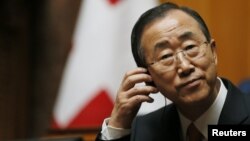UNITED NATIONS —
The United Nations Security Council and the secretary-general have added their voices to those strongly condemning the killing of four U.S. diplomatic staff members in Libya, including the ambassador.
U.S. Ambassador Christopher Stevens and three of his staff members were killed in an attack late Tuesday on the U.S. consulate in the eastern Libyan city of Benghazi. The attack occurred during a protest against an amateur short film made in the United States that insulted the Prophet Muhammad.
In a statement condemning the violence, U.N. Secretary-General Ban Ki-moon said the world body rejects defamation of religion in all forms, but added that there is no justification for the attack on the U.S. consulate.
Speaking at a previously scheduled Security Council briefing on Libya, U.N. political chief Jeffrey Feltman reminded the Libyan authorities of their obligation to protect diplomatic facilities and personnel and said this and other incidents underscore one of Libya's main challenges, security.
"This attack, together with a spate of assassinations of security personnel in Benghazi, a series of explosive devices in Tripoli, and attacks on Sufi shrines, further emphasize the security challenges facing the authorities in Libya," said Feltman.
Feltman, a former senior U.S. State Department official who knew Ambassador Stevens well, cited some progress in Libya's transition to democracy. He said the August 8 transfer of authority from the National Transitional Council to the 200-member General National Congress was a "historic moment."
"For the first time in over four decades, Libya now has a democratically-elected body," Feltman added.
Feltman said the U.N. Mission in Libya would focus its advisory and coordination efforts on areas including national security structure, police reform, preventing arms proliferation, and border security, and he added the United Nations is ready to assist the Libyans on issues involving their constitution.
The U.N. announced the mission will undergo a change of leadership next month, when envoy Ian Martin steps down and is replaced by Tarek Mitri, a former Lebanese minister and academic.
Libya's deputy ambassador, Ibrahim Dabbashi, said the attack on the U.S. consulate was carried out by an "extremist group" acting outside the law and gravely damaged the image of Islam.
Dabbashi reiterated his government's strong condemnation of the attack, said an investigation is underway and that those responsible would be brought to justice. Dabbashi noted several members of the Libyan security forces also were killed during the incident.
Ambassador Dabbashi told reporters afterwards that Libya still faces enormous challenges, especially on the security front.
"We have to say the reality - that the authority of the government is still not covering the whole territory of Libya and there are some groups and persons who are outlaws and the government could not until this moment contain all of them," Dabbashi explained.
The envoy paid tribute to Ambassador Stevens as a great friend of the Libyan people, and praised his bravery for remaining in the country during the revolution.
U.S. Ambassador Christopher Stevens and three of his staff members were killed in an attack late Tuesday on the U.S. consulate in the eastern Libyan city of Benghazi. The attack occurred during a protest against an amateur short film made in the United States that insulted the Prophet Muhammad.
In a statement condemning the violence, U.N. Secretary-General Ban Ki-moon said the world body rejects defamation of religion in all forms, but added that there is no justification for the attack on the U.S. consulate.
Speaking at a previously scheduled Security Council briefing on Libya, U.N. political chief Jeffrey Feltman reminded the Libyan authorities of their obligation to protect diplomatic facilities and personnel and said this and other incidents underscore one of Libya's main challenges, security.
"This attack, together with a spate of assassinations of security personnel in Benghazi, a series of explosive devices in Tripoli, and attacks on Sufi shrines, further emphasize the security challenges facing the authorities in Libya," said Feltman.
Feltman, a former senior U.S. State Department official who knew Ambassador Stevens well, cited some progress in Libya's transition to democracy. He said the August 8 transfer of authority from the National Transitional Council to the 200-member General National Congress was a "historic moment."
"For the first time in over four decades, Libya now has a democratically-elected body," Feltman added.
Feltman said the U.N. Mission in Libya would focus its advisory and coordination efforts on areas including national security structure, police reform, preventing arms proliferation, and border security, and he added the United Nations is ready to assist the Libyans on issues involving their constitution.
The U.N. announced the mission will undergo a change of leadership next month, when envoy Ian Martin steps down and is replaced by Tarek Mitri, a former Lebanese minister and academic.
Libya's deputy ambassador, Ibrahim Dabbashi, said the attack on the U.S. consulate was carried out by an "extremist group" acting outside the law and gravely damaged the image of Islam.
Dabbashi reiterated his government's strong condemnation of the attack, said an investigation is underway and that those responsible would be brought to justice. Dabbashi noted several members of the Libyan security forces also were killed during the incident.
Ambassador Dabbashi told reporters afterwards that Libya still faces enormous challenges, especially on the security front.
"We have to say the reality - that the authority of the government is still not covering the whole territory of Libya and there are some groups and persons who are outlaws and the government could not until this moment contain all of them," Dabbashi explained.
The envoy paid tribute to Ambassador Stevens as a great friend of the Libyan people, and praised his bravery for remaining in the country during the revolution.




